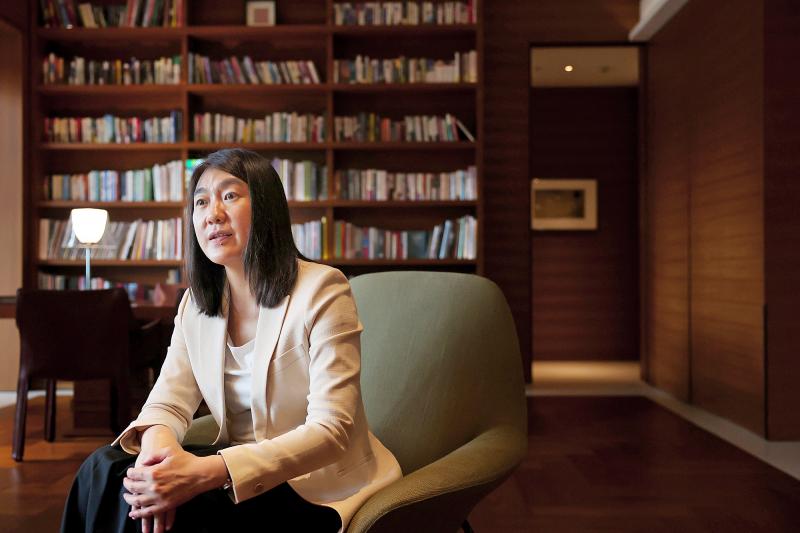Eslite Spectrum Corp (誠品生活), which runs the Eslite bookstore chain, department stores and leisure lifestyle services in Taiwan and abroad, aims to achieve revenue of NT$18.5 billion to NT$19 billion (US$628.9 million to US$645.93 million) this year after extending losses in the first quarter, chairwoman Mercy Wu (吳旻潔) said in an interview with the Chinese-language Commercial Times yesterday.
The Taipei-based group is struggling to swing back to profit after posting losses of NT$1.46 per share in the January-to-March period, as the COVID-19 pandemic weighs on its popular Eslite bookstores and department stores.
Eslite Spectrum has sought to survive by adopting an online-merges-offline (OMO) business model that enables offline retailers to tap into existing e-commerce platforms with better utilization of its business network and lower costs, the newspaper quoted Wu as saying.

Photo: CNA
The company incurred losses per share of NT$4.82 last year for the first time since its listing on the over-the-counter Taipei Exchange. Wu attributed the poor results to the COVID-19 pandemic and capital spending to create an online sales network.
The chilling effect was most evident in Eslite branches at transportation hubs and popular locations in northern Taiwan, she said.
The company last year launched a three-year transformation geared to restore annual revenue to the pre-pandemic level of NT$20 billion next year and boost it to NT$30 billion thereafter.
Reaching the NT$30 billion target would mean the company’s sales channels are growing, and its emphasis on cultural tourism, community life and e-commerce is paying off, Wu said in the interview, adding that the effort must eventually lead to improved earnings to be called successful.
Eslite Spectrum plans to open large flagship bookstores and small neighborhood outlets accross Taiwan as well as overseas to increase customers and expand its business scale, Wu told the newspaper.
The pandemic is reshaping business districts around Taiwan, with small retailers being forced out of the market while demand for food, beverages and recreation prove stronger than regular shopping, Eslite Spectrum said.
Further, the business mix and leasing structure of commercial properties have been forced to change, but consumer activity at the neighborhood level remains active, the company said.
Affiliate Eslite Hotel (誠品行旅) at the Songshan Cultural and Creative Park (松山文創園區) in Taipei is currently wooing domestic tourists before the government reopens Taiwan to foreign tourists, it said.

MULTIFACETED: A task force has analyzed possible scenarios and created responses to assist domestic industries in dealing with US tariffs, the economics minister said The Executive Yuan is tomorrow to announce countermeasures to US President Donald Trump’s planned reciprocal tariffs, although the details of the plan would not be made public until Monday next week, Minister of Economic Affairs J.W. Kuo (郭智輝) said yesterday. The Cabinet established an economic and trade task force in November last year to deal with US trade and tariff related issues, Kuo told reporters outside the legislature in Taipei. The task force has been analyzing and evaluating all kinds of scenarios to identify suitable responses and determine how best to assist domestic industries in managing the effects of Trump’s tariffs, he

TIGHT-LIPPED: UMC said it had no merger plans at the moment, after Nikkei Asia reported that the firm and GlobalFoundries were considering restarting merger talks United Microelectronics Corp (UMC, 聯電), the world’s No. 4 contract chipmaker, yesterday launched a new US$5 billion 12-inch chip factory in Singapore as part of its latest effort to diversify its manufacturing footprint amid growing geopolitical risks. The new factory, adjacent to UMC’s existing Singapore fab in the Pasir Res Wafer Fab Park, is scheduled to enter volume production next year, utilizing mature 22-nanometer and 28-nanometer process technologies, UMC said in a statement. The company plans to invest US$5 billion during the first phase of the new fab, which would have an installed capacity of 30,000 12-inch wafers per month, it said. The

Taiwan’s official purchasing managers’ index (PMI) last month rose 0.2 percentage points to 54.2, in a second consecutive month of expansion, thanks to front-loading demand intended to avoid potential US tariff hikes, the Chung-Hua Institution for Economic Research (CIER, 中華經濟研究院) said yesterday. While short-term demand appeared robust, uncertainties rose due to US President Donald Trump’s unpredictable trade policy, CIER president Lien Hsien-ming (連賢明) told a news conference in Taipei. Taiwan’s economy this year would be characterized by high-level fluctuations and the volatility would be wilder than most expect, Lien said Demand for electronics, particularly semiconductors, continues to benefit from US technology giants’ effort

‘SWASTICAR’: Tesla CEO Elon Musk’s close association with Donald Trump has prompted opponents to brand him a ‘Nazi’ and resulted in a dramatic drop in sales Demonstrators descended on Tesla Inc dealerships across the US, and in Europe and Canada on Saturday to protest company chief Elon Musk, who has amassed extraordinary power as a top adviser to US President Donald Trump. Waving signs with messages such as “Musk is stealing our money” and “Reclaim our country,” the protests largely took place peacefully following fiery episodes of vandalism on Tesla vehicles, dealerships and other facilities in recent weeks that US officials have denounced as terrorism. Hundreds rallied on Saturday outside the Tesla dealership in Manhattan. Some blasted Musk, the world’s richest man, while others demanded the shuttering of his